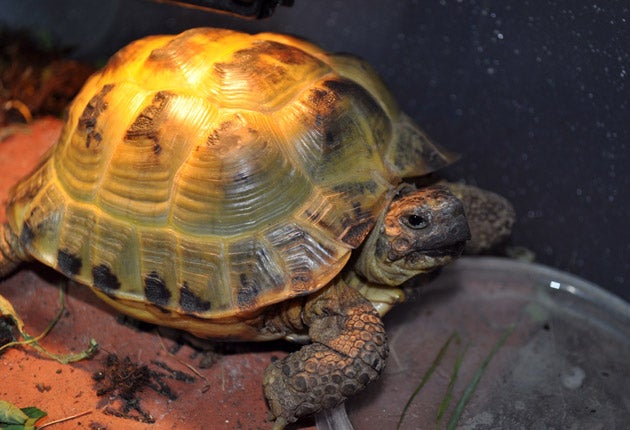Under the Microscope: Why do animals hibernate?

Asked by: Rachel Arnold, London
Answered by: Professor John Altringham, Chair in Animal Ecology and Conservation, University of Leeds
What happens when an animal hibernates?
Hibernation is a state of physiological inactivity triggered by seasonal changes in an animal's habitat. Animals recognise shortening days and falling temperatures through evolutionary development, so are able to recognise the onset of winter. When certain external stimuli are detected, they produce a hormone called "hibernation-specific protein". This protein, identified in 2006 by scientists at the Life Science Institute of Tokyo, triggers the metabolic depression that leads to the "sleep state". Heart and breathing rate slow, blood supply is restricted, and non-essential organs may go into stasis.
As a result, their core temperature falls. This has two consequences. As the optimal internal temperature comes closer to the ambient temperature, less energy is needed for thermo-regulation. At the same time, energy demand is further reduced because of the drop in organ function. Both help the animal survive through the winter months.
Which animals hibernate?
A significant number of creatures in the temperate world hibernate. It is a notable behavioural feature in many mammals, such as the bat and bear; amphibians; butterflies and a number of other insects; and, of course, reptiles – the most widely known being the tortoise.
We used to think some birds hibernated – the ancient Roman naturalist Pliny the Elder wrote about hibernating swallows – but we now recognise that they actually use torpor, a truncated version of hibernation.
What triggers hibernation?
Hibernation is a response to the ecological imperatives of winter. Like humans, animals require a relatively stable internal temperature for their cells to function properly – even cold-blooded animals cannot brook too drastic a change in temperature.
When the ambient temperature falls, it becomes harder to maintain the internal temperature necessary for metabolic reactions to take place. Ever larger quantities of energy – either from fat stores or from new sources of starch – are required to maintain this thermal level. However, winter is a time of scarcity, so animals have to use coping mechanisms to survive. One such mechanism is hibernation. To put it simply, hibernating animals sleep their way through the difficult winter months.
Why don't all animals in the temperate world do it?
Not all animals need to. Most species have evolved in such a way as to render the process unnecessary. Humans, for example, have developed mental faculties which allow us to change our behaviour to take into account a fall in temperature. When we put on a woolly jumper and eat a bowl of soup we are making use of our evolutionary intelligence and effectively outsmarting the cold.
The only animals that need to hibernate are those whose physiological characteristics make them vulnerable to the cold. A large surface-area-to-volume ratio makes such animals highly vulnerable to reductions in external temperature, as they have a large area from which to radiate heat and a small volume of cells from which to generate it through the breakdown of starch.
An appropriate metaphor would be a small heater in a greenhouse in winter: with a large surface area of glass through which the heat will radiate, it is very difficult for the heater to produce enough warmth to keep the green house at a comfortable temperature.
Why don't wild animals hibernate for longer than domestic pets?
The first thing to note is that hibernation periods are not fixed. Variance occurs not only between species, but also within them. Individual British bats, for example, go into hibernation at differing points between November and March. And while the exact time hibernation begins is dependent on individual environment, they will all at some point go into stasis.
Domestication, then, will not eradicate the physiological reaction to winter: a warm shoebox and plentiful food won't prevent a hedgehog hibernating, for example. That said, domestication may have an effect on the patterns of hibernation. Domestic animals may wake more frequently and return to normal temperature more readily than a wild animal.
What happens if I wake a hibernating animal?
Contrary to popular belief, hibernation is not a long "sleep" during which an animal remains in suspended animation. In fact, hibernation is a transitory state and is punctuated by periods of arousal when the body comes out of "sleep" and metabolic processes resume at normal rates. So although you should avoid waking a hibernating animal, it will not necessarily cause any lasting trauma.
Send your science questions to microscope@independent.co.uk
Join our commenting forum
Join thought-provoking conversations, follow other Independent readers and see their replies
Comments
Bookmark popover
Removed from bookmarks